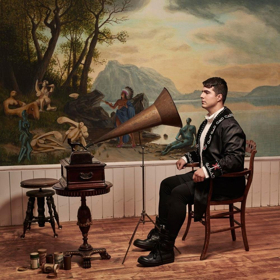First Nation Composer Jeremy Dutcher on Polaris Prize Shortlist for Best 10 Records in Canada

Jeremy Dutcher is a Toronto-based performer, composer, and classically trained operatic tenor. He is also a member of indigenous community, Tobique First Nation, and released his debut album, Wolastoqiyik Lintuwakonawa (Our Maliseet Songs), on April 6th, 2018. He is now on the shortlist for the Polaris Music Prize for the best Canadian album of 2018, and an 11-member jury will decide a winner on September 17, 2018. Dutcher's new album was also just named one of Noisey's "40 Essential Albums You Probably Missed So Far in 2018" list.
The exclusive first listen of the album went live on Billboard, who says, "is an 11-song fusion of his ancestors' archival recordings and his own classical and pop influences, intended to disrupt the "bilingual Anglo-centric Canadian music narrative,'" adding, "The 27-year-old -- who is a member of the Tobique First Nations in northwestern New Brunswick, and studied music in Halifax, Nova Scotia -- doesn't believe this music should be "collecting dust on a museum shelf," so he took five years to painstakingly put this album together, transcribing Wolastoq songs more than a century-old - once banned from being performed in public due to the Canadian government's discriminatory Indian Act from 1876 - to re-introduce them to the world."
In an interview with Bilboard, Dutcher was asked if he grew up with these songs, to which he responded, "This is why I'm so passionate about doing this - because I didn't." When asked if he expects people to learn his language, he said, "Yes. I do, 100%. Why not? We learned yours. For me, it's less about asking people to learn a new language and more about disrupting the bilingual Anglo-centric Canadian music narrative. Up until this point, why have there been no popular records in my language?" and even teaches readers a few phrases, which can be found in the interview.
The album is a collection of "collaborative" compositions that blend Jeremy's ancestors' archival recordings with both classical and contemporary influences. The result transcends musical boundaries: dramatic, infused with emotion and reverence for the songs of his home, sweeping piano solos and stunning vocals.
All of the songs are sung in the Wolastoqey language and there are less than 100 speakers of the language left in Canada. Jeremy feels strongly this album is an imperative tool to get younger generations engaged with and excited about Wolastoqey. "If you lose the language, you're not just losing words; you're losing an entire way of seeing and experiencing the world from a distinctly indigenous perspective."
Now 27 years old, Jeremy was studying music years ago in Halifax when he had an epiphany. "I started to look into the canon of classical music for content that dealt with indigenous issues, or was written by indigenous people," he recalls, "and there's not too much....so I decided to find it myself"
Jeremy poured through archives at the Canadian Museum of History to painstakingly transcribe Wolastoq songs from 100 year old wax cylinder recordings. "Many of the songs I'd never heard before, because our musical tradition on the East Coast went underground." As a measure of the Canadian Government's Indian Act, all ceremonial songs and dances were banned in public for decades. Jeremy heard ancestral voices singing forgotten songs and stories that had been taken from the Wolastoqiyik generations ago.
"I started to listen to this amazing archive and understood at once that it was my responsibility to bring these back to the people," he explains, "and think about all the good things these songs could bring into our community if we start to sing them again. Song is just one part of a multifaceted project of reclamation of Wolastoqiyik identity."
For Jeremy, it was clear early on that this project would be about much more than just recovery. As he listened to each recording, he felt his own musical impulses stirring from deep within. Long days at the archives turned into long nights at the piano, feeling out melodies and phrases, deep in dialogue with the voices of his ancestors.
These "collaborative" compositions, collected together on his debut LP Wolastoqiyik Lintuwakonawa, are like nothing you've ever heard. Delicate, sublime vocal melodies ring out atop piano lines that cascade through a vibrant range of emotions. The anguish and joy of the past erupt fervently into the present through Jeremy's bold approach to composition and raw performances.
He's performed songs from Wolastoqiyik Lintuwakonawa in small concerts and workshops, and on recent tours through Asia and Scandinavia, as well as on the cross-country New Constellations tour. In November 2017, he joined several promising artists and thinkers from indigenous communities on this tour across Canada, an exciting one-night showcase of new music and revolutionary ideas curated by RPM Records and The Basement Revue.
The tour was a natural fit for an advocate and experimenter like Jeremy. RPM Records also released Jeremy's first official music with Honor Song, a new interpretation of the Mi'kmaq anthem written by George Paul.
Says Jeremy, "We need to be insistent and unapologetic in telling our story on our own terms."
JEREMY DUTCHER 2018 North American dates:
07/28- Calgary, Canada - Calgary Folk Fest
07/29 - Calgary, Canada - Calgary Folk Fest
08/01 - Bar Harbor, ME (US) - Abbe Museum
08/04 - Sackville, Canada - Sappy Fest
08/18 - Greater Sudbury, Canada - Grand Theatre
11/03 - Quebec City, Canada - Palais Montcalm
Comments
Videos

